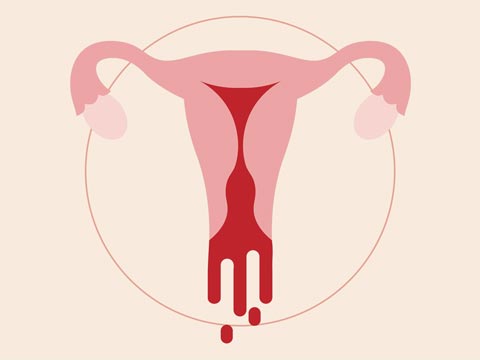What is Menorrhagia?
Menorrhagia refers to abnormally heavy or prolonged menstrual bleeding. If you experience any of the following, you may be dealing with menorrhagia:
- Periods lasting longer than seven days.
- Needing to change your pad or tampon every hour for several consecutive hours.
- Wearing multiple pads at once to avoid leakage.
- Waking up at night to change your pad.
- Passing blood clots the size of a quarter or larger multiple times a day.
- Being unable to carry out normal daily activities during your period.
While menstruation can be uncomfortable for many, menorrhagia can significantly disrupt your quality of life—making it difficult to attend work, school, or even leave the house due to excessive bleeding and discomfort.
If you identify with any of these symptoms, it’s important to seek medical guidance. Gynecologist in Delhi – Dr. Sadhana Gosain can help assess your condition, identify underlying causes, and recommend effective treatment options to manage heavy menstrual bleeding.
Symptoms of Menorrhagia (Heavy Menstrual Bleeding)
Menorrhagia is characterized by excessively heavy or prolonged menstrual bleeding that can interfere with daily life. Common symptoms include:
- Bleeding that lasts longer than 7 days
- Soaking through one or more pads or tampons every hour for several consecutive hours
- Wearing multiple sanitary products at once to control bleeding
- Waking up during the night to change pads or tampons
- Passing large blood clots (the size of a quarter or larger)
- Experiencing fatigue or shortness of breath due to blood loss
- Severe menstrual cramps or lower abdominal pain
Missing work, school, or social activities because of heavy bleeding
Causes of Menorrhagia (Heavy Menstrual Bleeding)
Menorrhagia can result from various underlying medical conditions, hormonal imbalances, or lifestyle factors. Understanding the cause is essential for effective treatment. Common causes include:
- Hormonal Imbalances:An imbalance between estrogen and progesterone can lead to a thickened uterine lining, causing heavier bleeding when it sheds.
- Uterine Fibroids: Noncancerous growths in the uterus, called fibroids, can increase menstrual bleeding and cramping.
- Polyps: Small, benign growths on the lining of the uterus can contribute to prolonged or heavy bleeding.
- Adenomyosis:A condition where the uterine lining grows into the muscle wall of the uterus, often causing heavy and painful periods.
- Ovulation Disorders:Irregular or absent ovulation can disrupt hormonal balance, leading to menorrhagia.
- Bleeding Disorders:Inherited bleeding disorders like von Willebrand disease can affect blood clotting and result in excessive menstrual bleeding.
- Certain Medications:Some anti-inflammatory drugs, anticoagulants, and hormonal medications can increase menstrual flow.
- Infections:Pelvic inflammatory disease or other infections in the reproductive organs may cause abnormal bleeding.
- Intrauterine Devices (IUDs):Non-hormonal IUDs, particularly copper-based ones, may cause heavier periods in some individuals.
- Cancer:Though rare, cancers of the uterus, cervix, or ovaries can cause abnormal menstrual bleeding.
If you are experiencing unusually heavy or prolonged periods, it’s important to consult a specialist. Gynecologist in Delhi – Dr. Sadhana Gosain can help diagnose the underlying cause of menorrhagia and provide personalized treatment options to improve your health and well-being.
What Are the Complications of Heavy Menstrual Bleeding?
Heavy menstrual bleeding can lead to serious health issues if not addressed in time. One of the most common complications is anemia, a condition caused by a significant loss of red blood cells. Anemia can lead to fatigue, weakness, shortness of breath, and in severe cases, may become life-threatening if left untreated.
Additionally, some underlying causes of heavy bleeding—such as uterine fibroids, hormonal imbalances, or even reproductive cancers—require early diagnosis and timely medical intervention.
If you’re experiencing unusually heavy periods, it’s essential to consult a medical expert. Gynecologist in Delhi – Dr. Sadhana Gosain can help identify the root cause and guide you through appropriate treatment options to protect your health.
How Is Menorrhagia Diagnosed?
Diagnosing menorrhagia begins with a detailed medical history and a thorough physical and pelvic examination. Your healthcare provider—such as Gynecologist in Delhi, Dr. Sadhana Gosain—will ask questions to better understand your symptoms and their impact on your daily life.
Your Provider May Ask About:
- The age at which you got your first period
- How many days your period typically lasts
- How many days your flow is considered heavy
- Any family history of heavy menstrual bleeding
- Your pregnancy history and current birth control methods
- Any medications you’re taking, including over-the-counter drugs
Be prepared to discuss how heavy periods affect your quality of life. For example, you may be:
- Doubling up on menstrual products
- Avoiding certain activities
- Staying home from work or school
This information helps your provider determine the severity of the condition and plan further diagnostic steps.
What Tests Are Used to Diagnose Menorrhagia?
A pelvic ultrasound is typically the first imaging test used to evaluate heavy menstrual bleeding. Depending on your symptoms, age, and risk factors, additional tests may be recommended, such as:
Laboratory Tests:
- Blood tests: To check for anemia, clotting disorders, or thyroid dysfunction
- Pap smear: To detect abnormal cervical cells that may indicate cancer or pre-cancer
- Cervical culture: To identify any infection
Imaging & Diagnostic Procedures:
- Transvaginal ultrasound: Provides detailed images of your uterus and other pelvic organs
- MRI: Used when more detailed imaging is needed, especially to evaluate uterine abnormalities
- Endometrial biopsy: Involves collecting a tissue sample from the uterine lining to check for cancer or hormonal irregularities
Other Specialized Procedures:
- Sonohysterography (Saline Infusion Sonogram): A procedure where saline is introduced into the uterus to enhance ultrasound imaging and detect abnormalities in the uterine lining
- Hysteroscopy: A small camera is inserted through the cervix into the uterus, allowing direct visualization of polyps, fibroids, or abnormal tissue. Minor procedures, like removing growths, can also be done during hysteroscop
If you are experiencing symptoms of menorrhagia, timely diagnosis is key to effective treatment. Consult Gynecologist in Delhi – Dr. Sadhana Gosain for a comprehensive evaluation and personalized care.
What Is the Best Treatment for Menorrhagia?
The best treatment for menorrhagia depends on the underlying cause, severity of symptoms, your overall health, and personal preferences. Treatments may range from lifestyle changes and medications to surgical options. A specialist like a Gynecologist in Delhi – Dr. Sadhana Gosain can help determine the most appropriate approach for you.
Common Treatment Options Include:
- Medications
- Nonsteroidal anti-inflammatory drugs (NSAIDs): Help reduce bleeding and relieve pain.
- Hormonal therapies: Birth control pills, hormonal IUDs, or hormone therapy can regulate or reduce menstrual flow.
- Tranexamic acid: Helps reduce bleeding by promoting blood clotting during periods.
- Iron supplements: To treat or prevent anemia caused by heavy bleeding.
- Surgical Treatments (considered when medications are ineffective or not suitable)
- Endometrial ablation: Destroys the uterine lining to reduce or stop bleeding.
- Myomectomy: Surgical removal of fibroids if they are causing heavy bleeding.
- Polypectomy: Removal of uterine polyps.
- Hysterectomy: Complete removal of the uterus; considered a last resort when other treatments fail.
- Lifestyle and Home Care
- Maintaining a balanced diet and managing stress can help improve overall menstrual health.
- Monitoring and recording your menstrual cycle to share accurate information with your healthcare provider.
If you are struggling with heavy periods, consult Gynecologist in Delhi – Dr. Sadhana Gosain to receive a personalized treatment plan tailored to your needs.
Why Choose Dr. Sadhana Gosain – Gynecologist in Delhi for Treatment?
When it comes to managing menorrhagia and other gynecological concerns, choosing the right specialist is crucial. Dr. Sadhana Gosain, a renowned Gynecologist in Delhi, combines extensive expertise, compassionate care, and advanced treatment options to ensure the best outcomes for her patients.
Reasons to Choose Dr. Sadhana Gosain:
- Expertise and Experience: With years of specialized training in gynecology, Dr. Gosain is skilled in diagnosing and treating a wide range of menstrual disorders, including menorrhagia.
- Personalized Care: She takes the time to understand your unique symptoms, medical history, and lifestyle to develop a treatment plan tailored specifically to your needs.
- Advanced Diagnostic Techniques: Utilizing state-of-the-art diagnostic tools such as pelvic ultrasounds, hysteroscopy, and minimally invasive procedures, Dr. Gosain ensures accurate diagnosis and effective treatment.
- Comprehensive Treatment Options: From medical management to surgical interventions, she offers the latest and most effective therapies to help you regain control over your health.
- Patient-Centered Approach: Dr. Gosain prioritizes open communication, education, and emotional support, helping you feel comfortable and informed throughout your treatment journey.
- Convenient Location: Based in Delhi, her clinic is easily accessible for timely consultations and follow-ups.
For expert care and compassionate treatment of menorrhagia and other gynecological health issues, trust Dr. Sadhana Gosain – Gynecologist in Delhi. Schedule your consultation today to take the first step toward better health.




